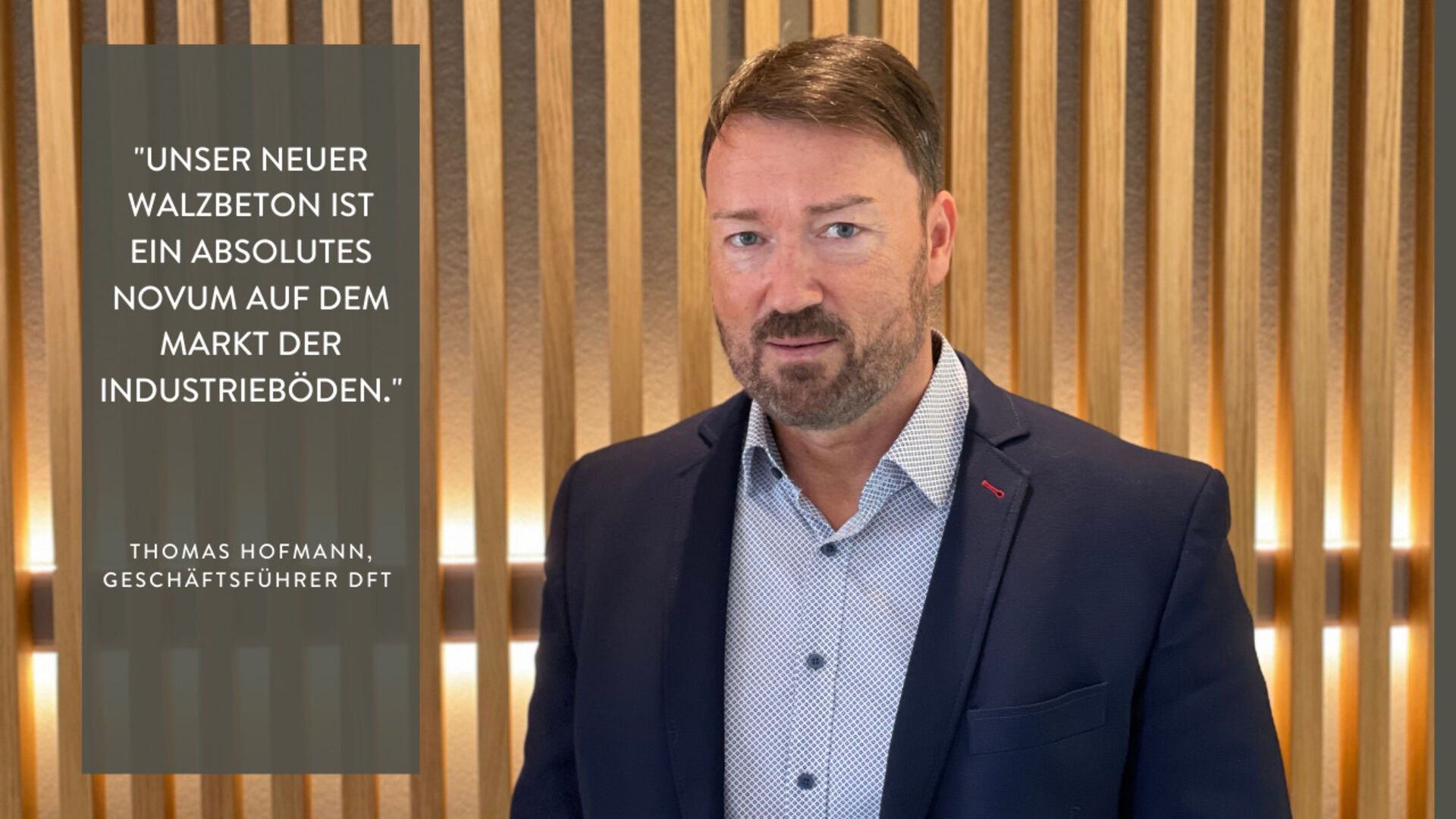DFT: INNOVATIVE TENANTS OF THE PEPER & SÖHNE GROUP
Bremen is one of Germany's most important aerospace locations. But to see innovative developments in Bremen, you don't necessarily have to look to the sky. Sometimes they lie beneath your own feet - especially when the company DFT, a specialist in industrial flooring and one of our most loyal tenants, is involved. A conversation with Thomas Hofmann, Managing Director of DFT Deutsche Flächen-Technik, about a very special industrial floor.
Mr Hofmann, your company has developed a prototype solution for hall floors. What is it exactly?
We have developed a steel-fibre-reinforced rolled concrete - an absolute novelty. There has never been such a rolled concrete for industrial floors before. Classical roller compacted concrete can look back on decades of tradition. It originally comes from road construction and was used by DFT and later also by other competitors for the floors of industrial and commercial properties.
To what extent does steel fibre reinforced roller compacted concrete represent a further development?
With this floor solution, we are able to serve important structural-physical parameters in accordance with the state building code. These parameters are in the area of punching shear strength and the limitation of cracks. This is very important when you think of shelved areas, for example. These tend to be higher and therefore heavier. So you have to make sure that the component is stable and not susceptible to cracks. We ensure this by adding steel fibres. Our reinforced rolled concrete offers significantly higher flexural strengths and is at the same time considerably less susceptible to cracking than classic rolled concrete.
Are these the only advantages?
Not at all. Our floor requires 45 percent less cement per cubic metre than the established industrial floor made of steel fibre concrete. In addition, the CO2 emissions are considerably lower due to larger transport quantities per delivery compared to conventional ready-mixed concrete. After professional installation, our solution fulfils the same structural-physical parameters as comparatively "soft" steel fibre concrete, i.e. it is just as strong. At the same time, we save large amounts of CO2. In addition, we need significantly less water than the established systems to produce the earth-moist rolled concrete. So in addition to the structural advantages, our steel fibre-reinforced roller compacted concrete also has clear advantages in terms of sustainability.
More sustainable solutions have the reputation of being more costly for the client. Is that also the case here?
That depends on the size of the area. The advantages of our system in terms of building physics enable us to produce larger daily fields. Due to the lower cement content in the building component, we generate cost advantages, especially with regard to strongly increasing climate protection taxes for raw materials. This puts us in a position to produce at prices similar to those of the established systems.
Are there any new developments comparable to your system in Germany?
We are the first manufacturer to venture into this field and, as far as I know, the only one to offer something like this. At the same time, we are currently working on a monolithic solution. There, steel fibre-reinforced components with hard material interspersion are to be used - a very attractively priced product, which is currently still in the research and development phase.
What other products does DFT currently offer?
There is, for example, our plastic-modified high-performance screed Brecoplan. Basically, however, DFT is very well positioned for all industrial floors. Whether steel fibre concrete of the conventional type, unreinforced or conventionally reinforced floors - we cover it all.
Traditionally, DFT has its headquarters at Allerkai in Bremen-Hemelingen, but it will soon be moving to a new building in Friedrich-List-Straße in the Hansalinie industrial park. What distinguishes the new location?
First of all, the move is a great decision for us and we thank the Peper & Söhne Group for allowing us to implement this project together. The new location will of course be much more modern in terms of office space. For example, we will have conference rooms for further education and internal training. We want to inspire young people and the premises play an important role in this. In addition, there are tangible business advantages: In future, we will be able to do without externally rented workshop space and services.
Mr Hofmann, thank you very much for the interview!
About
Thomas Hofmann is the managing director of DFT. The company is a long-standing tenant of the Peper & Söhne Group and part of the Possehl Group of Companies. The new location that the Peper & Söhne Group is realising for DFT is scheduled to be ready for occupancy in the 2nd quarter of 2022.
